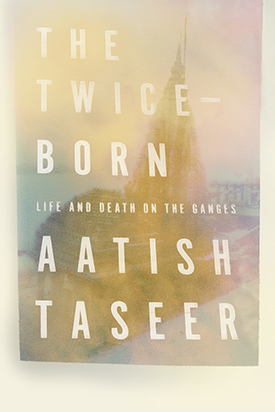In The Twice-Born, Aatish Taseer embarks on a journey of self-discovery in an intoxicating, unsettling personal reckoning with modern India, where ancient customs collide with the contemporary politics of revivalism and revenge
When Aatish Taseer first came to Benares, the spiritual capital of Hinduism, he was eighteen, the Westernized child of an Indian journalist and a Pakistani politician, raised among the intellectual and cultural elite of New Delhi. Nearly two decades later, Taseer leaves his life in Manhattan to go in search of the Brahmins, wanting to understand his own estrangement from India through their ties to tradition.
Known as the twice-born—first into the flesh, and again when initiated into their vocation—the Brahmins are a caste devoted to sacred learning. But what Taseer finds in Benares, the holy city of death also known as Varanasi, is a window on an India as internally fractured as his own continent-bridging identity. At every turn, the seductive, homogenizing force of modernity collides with the insistent presence of the past. In a globalized world, to be modern is to renounce India—and yet the tide of nationalism is rising, heralded by cries of “Victory to Mother India!” and an outbreak of anti-Muslim violence.
From the narrow streets of the temple town to a Modi rally in Delhi, among the blossoming cotton trees and the bathers and burning corpses of the Ganges, Taseer struggles to reconcile magic with reason, faith in tradition with hope for the future and the brutalities of the caste system, all the while challenging his own myths about himself, his past, and his countries old and new.
Praise for The Twice-Born
“[The Twice-Born] doesn’t sit squarely in the camp of memoir, travelogue, or long-form reportage. It hovers among the three—but with such lilting grace as to make that limbo feel like a lovely hybrid . . . Taseer grew up in cosmopolitan, postcolonial New Delhi but has spent much of his adult life in the U.S. and Europe. The result is an alienation from the India he considers both his homeland and a foreign land . . . [The Twice-Born is] a poetic quest to bridge that gap or at least better understand it.”
—Chloe Malle, Vogue
“A gorgeous, sinister portrait of Benares . . . Taseer’s wonderfully atmospheric rendition of landscapes and gnarled social psychologies make for an engrossing dissection of India’s discontents.”
—Publishers Weekly
Aatish Taseer was born in 1980. He is the author of the memoir Stranger to History: A Son’s Journey Through Islamic Lands and the acclaimed novels: The Way Things Were, a finalist for the 2016 Jan Michalski Prize; The Temple-Goers, which was short-listed for the Costa First Novel Award; and Noon. His work has been translated into more than a dozen languages. He is a contributing writer for The International New York Times and lives in New Delhi and New York.
